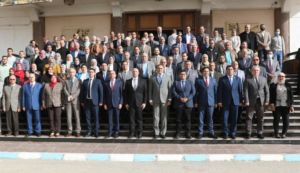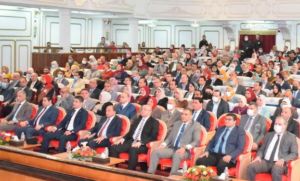On Thursday, December the 9th,2021, Prof. Dr. Mohamed Shoukr Nada, President of Bani Swief Technological University, participated in the symposium organized by the Administrative Control Authority in cooperation with Beni Suef Governorate, entitled “We Prevent and Struggle to Prosper” in the celebration of the International Anti-Corruption Day in coordination with the Beni Suef University at the Great Celebrations Hall of the University Theater.
That was in the presence of Dr. Mohamed Hani Ghoneim, Governor of Beni Suef, Prof. Dr. Mansour Hassan, President of Beni Suef University, General Mohamed Galal, head of the Administrative Control Authority office in Beni Suef, members of the Administrative Control Office in Beni Suef, members of the House of Representatives and Senate and leaders in Beni Suef.
The symposium has reviewed the role of the Administrative Control Authority in combating corruption; General Mohamed Galal, Head of the Administrative Control Office in Beni Suef, has revealed the importance of the Authority’s role at the governorate level, in preventing and combating corruption and addressing it with the various state authorities, in order to preserve its capabilities and put rights into perspectives, based on the comprehensive vision of The National Anti-Corruption Strategy, which is included in its sectors and offices widespread throughout Egypt. He also has explained the role of the National Anti-Corruption Academy as one of the newly established institutions affiliated with the authority; whereas the academy implements training programs aiming at raising societal awareness of the importance of combating corruption at all levels. His Excellency also affirmed the commitment of the state’s leadership and people to the rule of law in all the state’s institutions, their rejection to all forms and practices of corruption, and consolidation of the values of integrity and transparency. Finally, his Excellency reviewed the most successful practices of the state, which contribute to preventing and combating corruption and enhancing the values of integrity and transparency, which led to improving the quality of services, raising citizens’ living standard, achieving social justice, building citizens’ confidence in state institutions, encouraging development and attracting investment.



